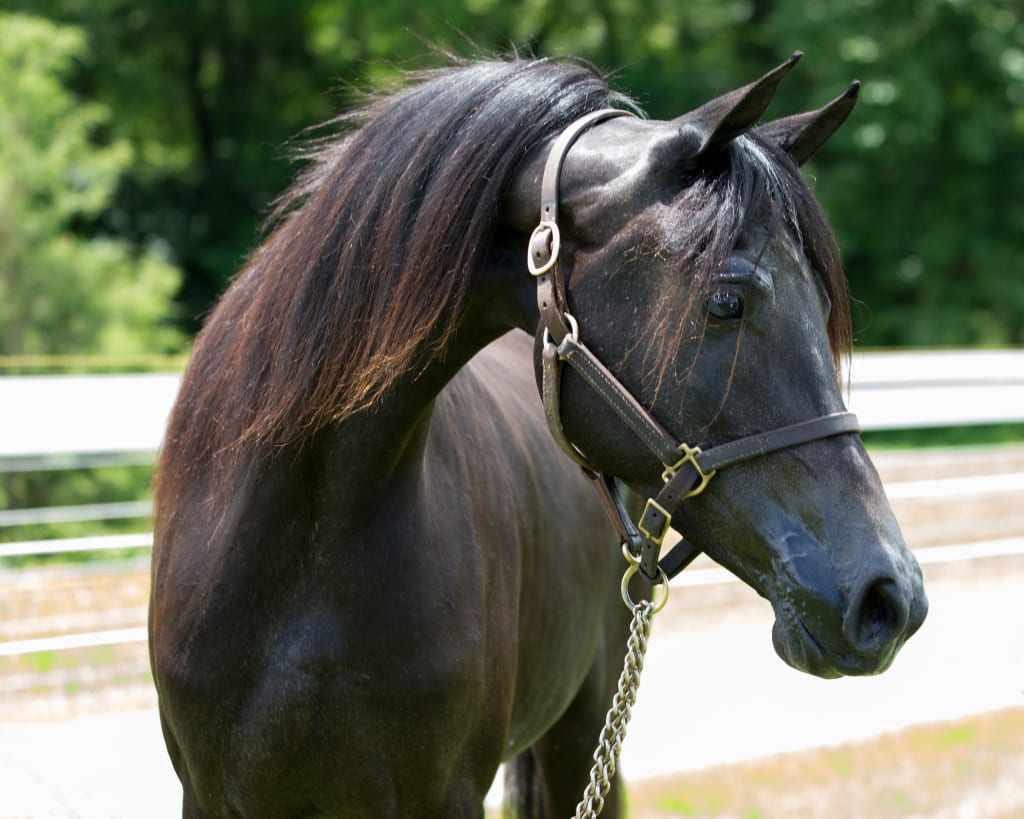The Majestic Beauty of the Black Arabian Horse
Training and Caring

The Black Arabian Horse is a magnificent creature that has captivated the hearts of horse enthusiasts for centuries. Known for their beauty, grace, and athleticism, these horses are highly sought after for riding, showing, and breeding. However, owning a horse requires significant time, energy, and resources to ensure their health and well-being.
The Black Arabian Horse is a breed of horse that originated in the Arabian Peninsula. They are known for their distinctive black coat, rare among Arabian horses. These horses are prized for their intelligence, courage, and endurance, making them well-suited for various equestrian pursuits.
Caring for and training a horse is a significant responsibility that requires much time, effort, and dedication. Proper care and training can help ensure the horse remains healthy, happy, and well-behaved. Additionally, a well-trained horse is easier to handle, making riding and other activities more enjoyable.
This blog will provide an overview of the Black Arabian Horse, including its history, physical characteristics, and temperament. It will also offer advice on how to care for and train these horses, including feeding and nutrition, grooming, exercise, and advanced riding techniques. Additionally, the blog will cover common health concerns, preventative measures, and tips for showing a Black Arabian Horse in competition.
Understanding the Black Arabian Horse
The Black Arabian Horse is among the oldest and most influential horse breeds. These horses have been bred in the Arabians for over 4,000 years and were initially used for transportation, warfare, and breeding. Bedouin tribes highly prized them for their strength, speed, and stamina, and they were often used as war horses. Over time, the breed was refined to become one of the world's most recognizable and sought-after horse breeds.
The Black Arabian Horse is known for its distinctive black coat, a recessive trait relatively rare among Arabian horses. In addition to their coat color, these horses are known for their refined, elegant appearance, with a small, dished face, arched neck, and long, lean legs. They typically stand between 14.1 and 15.1 hands tall and weigh between 800 and 1,000 pounds.
Black Arabian Horses are known for their intelligence, loyalty, and sensitivity. They are highly attuned to their surroundings and can be easily spooked or frightened if they feel threatened or insecure. However, they are also highly trainable and can develop strong bonds with their owners if treated with kindness and respect. Black Arabian Horses are often described as spirited and energetic, with a natural curiosity and desire to explore their environment.
Caring for a Black Arabian Horse
Feeding and nutrition are critical components of caring for a Black Arabian Horse. These horses require a balanced diet with the nutrients they need to maintain their health, energy, and fitness levels. They should be fed high-quality hay or pasture grass supplemented with grain or pellets. Owners should work with a veterinarian or equine nutritionist to develop a feeding plan that meets their horse's needs.
Also Read: Do Horses Like to be Ridden?
Grooming and coat care are essential to caring for a Black Arabian Horse. These horses have thick, lustrous coat that requires regular brushing and cleaning to maintain their health and shine. Owners should use a soft brush or curry comb to remove dirt and debris from the horse's coat and a hoof pick to clean their hooves. Additionally, owners should regularly bathe their horses to remove sweat, dirt, and other buildups that can cause skin irritation or infections.
Exercise and fitness are critical to keeping a Black Arabian Horse healthy and happy. These horses are naturally energetic and require regular exercise to maintain their strength, stamina, and mental well-being. Owners should provide their horses' ample opportunities to move and stretch through regular turnout, riding, or other forms of physical activity. Additionally, owners should work with a veterinarian or equine trainer to develop an exercise program that meets their horse's needs and abilities.
Training a Black Arabian Horse
Training a Black Arabian Horse requires patience, consistency, and a deep understanding of the horse's temperament and behavior. The first step in training is to establish trust and respect with the horse through groundwork exercises. These exercises include leading, lunging, desensitization, and basic commands such as halt, walk, trot, and canter. Owners should work with a professional trainer or instructor to develop a training plan that meets their horse's needs and abilities.
Once a horse has mastered the basics of groundwork, it can begin to learn more advanced riding techniques. These include lateral work, collection, extension, jumping, dressage, or other equestrian pursuits. Owners should work with a professional trainer or instructor to develop a riding program that meets their horse's specific abilities and goals.
Also Read: Mink vs Ferret
Building a solid relationship with a Black Arabian Horse requires time, patience, and consistency. Owners should build trust with their horses through positive reinforcement, clear communication, and consistency in training and care routines. Additionally, owners should spend time bonding with their horses outside of training sessions, such as through grooming, turnout, or other forms of interaction. By building a solid relationship with their horse, owners can create a lifelong partnership based on trust, respect, and mutual understanding.
Common Health Concerns
Genetic Conditions
Like all horses, Black Arabian Horses can be prone to certain genetic conditions that can impact their health and well-being. Some of the most common genetic diseases include SCID (Severe Combined Immunodeficiency), which can compromise a horse's immune system, and CA (Cerebellar Abiotrophy), which can cause neurological symptoms. Owners should work with a veterinarian to screen their horse for these and other genetic conditions and develop a plan for managing health issues.
Joint and Muscle Health
Black Arabian Horses are highly athletic and energetic, which can strain their joints and muscles over time. Common joint and muscle health concerns in horses include arthritis, tendonitis, and muscle strains or tears. Owners can prevent these issues by providing their horses with a balanced diet, regular exercise, and proper rest and recovery time between workouts. Additionally, owners should work with a veterinarian or equine chiropractor to identify joint or muscle issues early and develop a treatment plan to manage them.
Preventative Measures
Preventative measures are critical to maintaining a Black Arabian Horse's health and well-being. These include regular veterinary check-ups, vaccinations, deworming, and good hygiene and care practices. Owners should also proactively identify and manage health issues through common observation or consultation with a veterinarian. By taking a proactive approach to their horse's health, owners can ensure it stays healthy, happy, and strong for years.
Showing a Black Arabian Horse
Showing a Black Arabian Horse can be a rewarding experience, but it requires careful preparation and training. Owners should begin by selecting the suitable class for their horse based on age, experience level, and abilities. They should also work with a professional trainer or instructor to develop a training program that prepares their horse for the show ring, refining their movement, presentation, and behavior. Additionally, owners should ensure that their horse is in peak physical condition and has all the equipment and attire for the show.
Tips for Success in the Show Ring
Success in the show ring requires preparation, training, and presentation. Some tips for success include:
- Paying attention to details, such as grooming and attire
- Practicing your horse's expression and movement before the show
- Maintaining a calm and confident demeanor in the ring
- Building a solid partnership with your horse based on trust and respect
- Following the rules and regulations of the play, including any class-specific guidelines
Common Mistakes to Avoid
Owners make several common mistakes when showing their Black Arabian Horse. These include:
- Overworking or overtraining their horse before the show
- Focusing too much on winning rather than on enjoying the experience with their horse
- Neglecting to warm up and cool down their horse before correctly and after the show
- Being too aggressive or forceful with their horse in the ring
- Failing to follow the rules and regulations of the play can result in disqualification
By avoiding these common mistakes and following best practices for preparation and training, owners can ensure that their Black Arabian Horse has a successful and enjoyable experience in the show ring.
Wrapping Up
The Black Arabian Horse is a majestic and intelligent breed that has captured the hearts of horse lovers worldwide. Black Arabian Horses are a prized addition to any equestrian enthusiast's stable with their striking black coat, graceful movements, and loyal personalities. However, caring for and training a Black Arabian Horse requires significant time, effort, and resources.
From providing proper nutrition and grooming to developing a solid training program and maintaining good health practices, owning a Black Arabian Horse is a labor of love. Yet, for those willing to put in the effort, the rewards are immeasurable - a loyal and loving companion that brings joy and beauty to every aspect of life.
👉 Do you have any additional insights or questions? We highly value your feedback. Please share your thoughts by leaving a comment below.
About the Creator
Amir Hossain
I blog on everything and anything— hoping my blogs will make your days a bit happier!






Comments
There are no comments for this story
Be the first to respond and start the conversation.